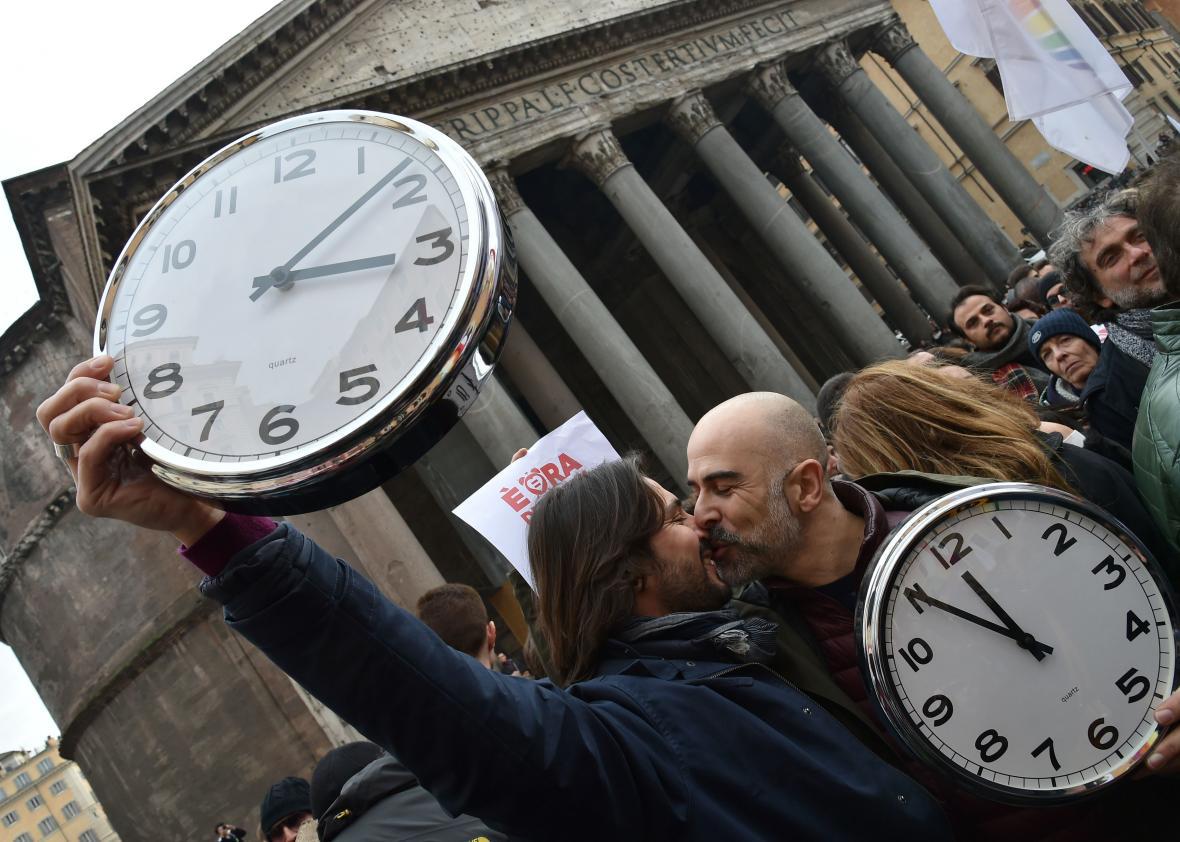Gay rights protests in Italy? If you remember recent stories about the backward state of LGBTQ rights in Italy—perhaps occasioned by Guido Barilla’s disparaging comments about gay families or Dolce & Gabbana’s equally puzzling comments about gay children—the photographs of hundreds of thousands of people protesting for gay rights across Italy may seem surprising. But since the Barilla boycott in 2013, Italian LGBTQ activists have slowly learned to be more vocal in challenging normalized homophobia. Inspired by strategies used by LGBTQ groups in the United States, they are in the process of dismantling Western Europe’s last bastion of “traditional marriage.”
A law providing for civil unions, which would represent the first recognition of gay couples in Italian history, is due to come to a vote in the next few weeks. On Jan. 23, a protest known as #wakeupItaly drew thousands of people in more than 100 cities in Italy and abroad. The organizers asked participants to bring alarm clocks to stress that it’s time for equality and that Italy needs to catch up to bring gay rights in line with what has already been enacted in other Western countries.
As in the United States and the 2015 referendum in the Republic of Ireland, Italy’s LGBTQ rights movement has prioritized gay unions to build broad public support for gay issues. Framing the approval of gay marriage as “the right to love” has been a successful strategy. While Italy has very few openly gay celebrities, many heterosexual personalities have supported #wakeupItaly and expressed a desire to see same-sex couples recognized.
Given the way marriage equality has been embraced abroad, it’s understandable that Italian society is feeling some pressure. In Spring 2015, Ireland proved that even a Catholic country could support same-sex marriage. Last summer, America’s Supreme Court made it impossible for Italian conservatives to use the argument that same-sex rights weren’t even recognised in the land of the free. Then, just before Christmas, Greece passed a law recognizing civil unions, leaving Italy as the only country in Western Europe without any kind of recognition for gay couples. While the rest of the world was changing, the European Court of Human Rights fined Italy and urged it to adopt laws that provide civil rights to same-sex couples.
Prime Minister Matteo Renzi, who promised to legalize civil unions, is facing opposition within his own center-left party, the Partito Democratico, from Catholic factions and opponents of gay rights. After parliament started to discuss gay issues, there was a draconian twist, with the approval of a law that outlaws the use of surrogates outside the country. (They are already forbidden in Italy.) Because of all the opposition, the proposed legislation that will come to a vote some time in February is extremely modest, extending some rights to partners but excluding gay people from parental rights through adoption or IVF. The only timid reference to parental rights in the proposed legislation is the possibility of adopting the children of a gay partner—so-called “stepchild adoption”—but even that is expected to be rejected. According to conservatives, stepchild adoption would be the thin end of the wedge toward recognizing gay families.
This weekend, a counterprotest called Family Day took place in Rome, calling for the continued denial of recognition for any families that diverge from the heterosexual orthodoxy. The event does not seem to have attracted the crowds that organizers expected, especially given the amount of free publicity it was afforded by politicians and after a famous transportation company offered special travel discounts to attendees (though it had previously refused to offer the same discounts for gay events).
Italian activists are well aware that the fight for LGBTQ equality is a long struggle and that Italians shouldn’t expect matters to be resolved with the approval of one law. Organizations working to advance LGBTQ rights via the courts, such as Rete Lenford, are offering legal support to individuals who wish to bring cases that might reach the European Court of Human Rights. This weekend, Rete Lenford held an event in Milan with James Esseks, one of the lawyers involved in Obergefell v. Hodges, and confirmed that their strategy to protect the rights of children excluded from the pending civil union legislation will be to take cases to the national and European courts.
In the meantime, there are other reasons to be cautiously optimistic about the development of gay rights in Italy, not least for the way homosexuality is being covered in the media. During the Barilla boycott in 2013, an Italian MP used the word faggot (frocio) in the Italian parliament without incurring any protest, much less sanction. A few days ago, in the world of soccer, where homophobic slurs are considered quite normal, Roberto Mancini, the manager of Inter Milan, called out Naples manager Maurizio Sarri for using the same word and started a real debate about homophobic speech—indeed, Sarri was suspended for two Italian Cup matches. A year after their bigoted comments about “traditional families,” Domenico Dolce and Stefano Gabbana are trying to reconcile their views (or, some might say, fix their marketing problem) by launching a new line of bags, featuring images of families, some of which include same-sex parents. Finally, stories about gay couples and coming out now appear on Italian primetime television (for example, in the show C’è posta per te, with Maria de Filippi, the Italian equivalent of Oprah), something that would have been unimaginable even two years ago. I watch from afar, as do many other gay Italians who are in voluntary exile, pleasantly surprised by the thought that Italy is starting to look quite different from the place I left.
